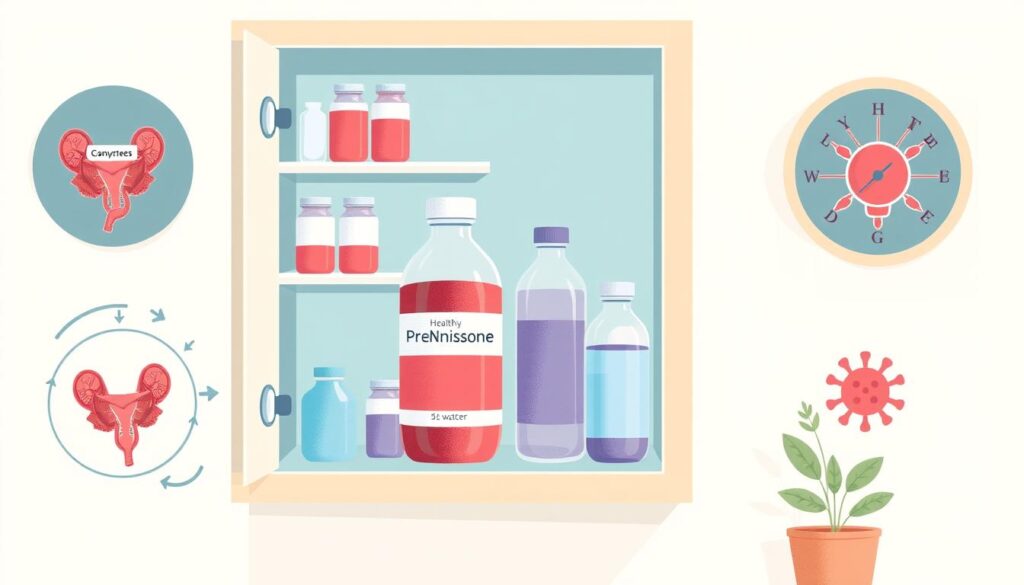Dealing with a urinary tract infection while on prednisone can be tough. We get how hard it is to handle these health issues together. We’re here to help you understand prednisone and UTIs better, with care and important medical info.
Handling a UTI with prednisone needs a lot of knowledge and smart plans. This guide will give you key facts about steroids and urinary health. It aims to help you make better choices for your health.
Key Takeaways
- Prednisone can potentially increase UTI risk
- Understanding symptoms is crucial for early detection
- Proper medical consultation is essential
- Lifestyle modifications can help manage UTI risks
- Comprehensive treatment involves multiple strategies
Understanding Prednisone and Its Uses
Prednisone is a key medication in today’s medicine. It helps people with many inflammatory and autoimmune issues. As a strong corticosteroid, it’s crucial for treating various health problems.
Exploring prednisone shows it’s a complex but powerful drug. We’ll look into its main features and uses in medicine.
What is Prednisone?
Prednisone is a man-made corticosteroid that acts like natural hormones from the adrenal glands. It fights inflammation and calms an overactive immune system. Doctors use it for many health issues, focusing on specific body inflammation.
How Does Prednisone Work?
This drug stops inflammatory signals in the body. When taken, prednisone:
- Reduces immune system activity
- Decreases inflammation
- Blocks specific chemical reactions
- Helps manage bacterial infection complications
Common Conditions Treated with Prednisone
Doctors often prescribe prednisone for several health problems, including:
- Rheumatoid arthritis
- Asthma
- Lupus
- Severe allergic reactions
- Certain types of cancer
“Prednisone represents a versatile tool in modern medical treatment, offering hope for patients battling complex inflammatory conditions.” – Dr. Sarah Thompson, Immunology Specialist
Even though it’s very helpful, using prednisone needs careful doctor supervision. Always talk to your doctor about its benefits and risks for your health.
The Link Between Prednisone and Urinary Infections
Prednisone, a strong corticosteroid, can make patients more likely to get urinary tract infections (UTIs). It’s important to know how prednisone and bacterial infections are connected, mainly for those on long-term treatment.
Prednisone weakens the immune system. This makes it easier for UTIs to happen. It stops the body’s natural defense against infections.
Can Prednisone Cause UTIs?
Prednisone doesn’t directly cause UTIs. But, it makes patients more open to getting infections. It hampers the immune system’s fight against harmful bacteria in the urinary tract.
- Reduces natural immune system protection
- Decreases ability to combat bacterial infections
- Creates conditions favorable for bacterial growth
Increased Risk Factors for UTIs on Prednisone
There are several risk factors for UTIs when taking prednisone:
- Compromised immune system
- Prolonged medication use
- Underlying health conditions
- Reduced ability to fight bacterial infections
“Awareness of potential infection risks is crucial for patients taking prednisone” – Medical Research Journal
Patients should stay in close touch with their doctors. This is to watch their health and use preventive measures with prednisone. Regular visits and good hygiene can lower the risk of UTIs.
Symptoms of a Urinary Tract Infection
It’s important to know the signs of a urinary tract infection (UTI) quickly. This is even more true for people taking prednisone. The medicine can make it harder to notice these symptoms because it weakens the immune system.
Early Warning Signs of UTIs
A UTI can show itself in several ways. It’s key for patients to watch out for these early signs:
- Frequent urination
- Burning sensation during urination
- Cloudy or strong-smelling urine
- Pelvic discomfort
- Low-grade fever
Severe Symptoms: When to Seek Help
Some UTI symptoms need urgent medical care. If you notice any of these, see a doctor right away:
- High fever above 101°F
- Severe back or side pain
- Blood in urine
- Persistent nausea or vomiting
“Early detection of UTI symptoms can prevent serious complications, even for those on immunosuppressive drugs like prednisone.” – Medical Professionals
| Symptom Category | Mild Indicators | Serious Warning Signs |
|---|---|---|
| Urination Patterns | Increased frequency | Complete urinary blockage |
| Pain Levels | Mild pelvic discomfort | Intense lower back pain |
| Infection Markers | Slight urinary changes | High fever and chills |
People on prednisone need to watch their UTI symptoms closely. This is because their immune system might be weaker.
Diagnosing a UTI While on Prednisone
Figuring out if you have a urinary tract infection (UTI) while taking prednisone is tricky. Prednisone can hide the usual signs of an infection. This makes it hard for doctors to spot a UTI.
Getting a correct diagnosis of a bacterial infection is key when you’re on prednisone. Prednisone weakens your immune system. This makes it harder to find UTIs using the usual methods.
Common Diagnostic Tests for UTIs
There are important tests doctors use to find UTIs:
- Urinalysis to detect bacteria and white blood cells
- Urine culture to identify specific bacterial strains
- Sensitivity testing to determine appropriate antibiotics
- Blood tests to check for systemic infection markers
The Critical Role of Medical History
When trying to figure out if you have a UTI on prednisone, your medical history is very important. You need to tell your doctor about:
- How much prednisone you’re taking
- How long you’ve been taking it
- If you’ve had UTIs before
- Any other health issues you have
“Thorough medical history can reveal subtle infection indicators that might be missed.” – Infectious Disease Specialists
| Diagnostic Method | Purpose | Effectiveness with Prednisone |
|---|---|---|
| Urinalysis | Detect infection signs | Moderate (may be altered by medication) |
| Urine Culture | Identify bacterial strain | High accuracy |
| Blood Tests | Check systemic infection | Helpful for comprehensive assessment |
We focus on a detailed check-up to make sure we diagnose UTIs on prednisone correctly. This helps us find the best treatment for you.
Treatment Options for UTIs
Understanding the treatment options for urinary tract infections is key. Our strategy targets bacterial infections to ensure your health and recovery. We focus on what works best for you.
Antibiotics: The First Line of Defense
Antibiotics are the main treatment for UTIs. We choose specific medicines based on the bacteria found. The choice depends on:
- Lab tests to find the exact bacteria
- Looking at antibiotic resistance patterns
- Considering your medical history
“Targeted antibiotic treatment can significantly reduce infection duration and prevent complications.” – Infectious Disease Specialists
Non-Antibiotic Treatments
We also offer non-traditional ways to manage UTIs. These include:
- Drinking more water to flush out bacteria
- Probiotics to keep the urinary tract healthy
- Herbal supplements with antimicrobial effects
We aim to reduce antibiotic resistance while treating infections well. Always talk to a healthcare professional to find the best treatment for your UTI.
Managing UTIs During Prednisone Treatment
Dealing with urinary tract infections while on prednisone is a big challenge. It requires careful planning and quick action. Patients on prednisone need to be proactive about their health.

Managing a UTI on prednisone involves several important steps. These steps help patients stay safe and keep their urinary system healthy.
Adjusting Prednisone Dosage
If a UTI happens while taking steroids, doctors might change the dosage:
- They might lower the prednisone dose.
- They’ll keep a close eye on how the infection grows.
- They might adjust the medication for a short time.
“Careful medication management is key to preventing complications during UTI treatment” – Urinary Health Specialists
Preventative Strategies for Recurrence
To lower the chance of getting UTIs again while on prednisone, try these:
- Keep yourself clean and hygienic.
- Drink lots of water and herbal teas.
- Eat foods that are good for your gut.
- Wear cotton underwear that breathes well.
We focus on keeping your urinary system healthy while on steroids. Working with your doctor is crucial to manage UTI risks effectively.
Side Effects of Prednisone Related to UTIs
Steroid treatment like prednisone can affect urinary health a lot. Knowing the side effects helps patients manage UTI risks better.
People on prednisone might face urinary tract problems. Our guide looks at how it affects urinary health and what to consider during treatment.
Common Side Effects of Prednisone
Prednisone can cause many side effects that raise UTI risks:
- Increased chance of getting infections
- Weaker immune system
- Possible bladder inflammation
- Changes in bacterial balance in the urinary tract
Long-Term Effects on Urinary Health
Long-term use of steroids can make managing UTIs harder:
| Effect Category | Potential Impact | Risk Level |
|---|---|---|
| Immune Suppression | Less resistance to infections | High |
| Hormonal Changes | Changes in the urinary tract environment | Moderate |
| Metabolic Disruption | Potential stress on the kidneys | Low to Moderate |
“Understanding prednisone’s complex interactions with your urinary system is crucial for maintaining optimal health.” – Infectious Disease Specialists
Patients should keep up with regular doctor visits to watch for UTI risks during steroid treatment.
Lifestyle Changes to Reduce UTI Risk
Managing urinary tract infection risks needs smart lifestyle changes. People on prednisone can lower their risk of bacterial infections with the right health habits.

We focus on two key areas: staying hydrated and making dietary changes that help urinary health.
Understanding Hydration’s Critical Role
Drinking enough water is a natural way to fight off UTIs. It helps wash out bad bacteria from your urinary system, cutting down on infection risks.
- Aim for 8-10 glasses of water daily
- Minimize caffeine and alcohol consumption
- Drink water consistently throughout the day
Strategic Dietary Adjustments
Some foods help, while others can harm your urinary health. Making smart food choices can help prevent infections.
| Food Category | Beneficial Effects | Recommended Intake |
|---|---|---|
| Probiotic Foods | Supports Gut and Urinary Health | 1-2 servings daily |
| Cranberry Products | Prevents Bacterial Adhesion | 1 glass/supplement daily |
| Vitamin C-Rich Foods | Boosts Immune Defense | 3-4 servings daily |
Our experts suggest talking to healthcare pros for a plan that fits you. Knowing UTI symptoms early helps you act fast to keep your health in check.
“Prevention is always better than cure, when it comes to urinary health during treatments.” – Medical Research Institute
Remember, everyone’s health is different. Always get advice from a doctor that fits your needs.
Natural Remedies for UTIs
Natural remedies can help when you have a urinary tract infection. They offer extra support along with medical treatments. Our guide looks at natural ways to manage UTI symptoms and keep your urinary system healthy.
Natural remedies are important for fighting urinary tract infections. They shouldn’t replace doctor’s advice, but they can help during treatment.
The Role of Cranberry Products
Cranberry supplements are popular for UTI prevention. Studies show they might stop bacteria from sticking to bladder walls. This could lower the chance of getting an infection.
- Cranberry juice concentrates
- Cranberry extract capsules
- Pure cranberry supplements
“Natural remedies can complement, but not replace, professional medical treatment for urinary infections.”
Herbal Supplements to Consider
Some herbs might help your urinary system and fight off infections. Always talk to a doctor before trying any new supplements.
| Herbal Supplement | Potential Benefits | Recommended Dosage |
|---|---|---|
| D-Mannose | Prevents bacterial adhesion | 500-2000mg daily |
| Uva Ursi | Antimicrobial properties | 250-500mg capsules |
| Goldenseal | Supports immune response | 500-1000mg daily |
Remember, how well natural remedies work can vary. If you keep getting UTI symptoms, see a doctor right away.
Talk to your doctor about these natural options. They can help create a treatment plan that fits your health needs.
When to Stop Taking Prednisone
Deciding to stop taking prednisone is a big decision. It needs careful thought and advice from a doctor. If you’re taking prednisone for a UTI, it’s important to know how to stop it right.

Stopping prednisone involves looking at several important factors. You should talk about these with your doctor. This helps manage your health safely and effectively.
Discussing with Your Healthcare Provider
Talking openly with your doctor is key when you think about stopping prednisone. They will look at a few things:
- How serious your medical condition is
- How long you’ve been taking steroids
- The risks of stopping the medicine too quickly
- Any health problems you have
Factors Influencing the Decision
Several things affect the decision to stop prednisone for UTIs:
| Factor | Impact on Discontinuation |
|---|---|
| Infection Status | Complete resolution of UTI symptoms |
| Inflammatory Markers | Normalized inflammation levels |
| Overall Health | Patient’s general medical condition |
Gradual tapering of prednisone is often recommended to prevent potential withdrawal complications. Never stop steroid treatment without your doctor’s advice.
“Your healthcare provider is your most trusted partner in managing prednisone treatment and understanding when to discontinue medication safely.” – Medical Professionals Consensus
It’s a good idea to make a plan with your doctor to stop prednisone. This helps manage your UTI treatment and your health well.
Seeking Help: Who to Contact
Getting medical help for a urinary tract infection while taking prednisone can be tough. Knowing who to call is key to getting the right treatment and avoiding complications.
If you have a urinary tract infection while on prednisone, you have several options. Choosing the right doctor can greatly impact your health.
Primary Care vs. Specialist Care
Choosing the right doctor depends on a few things:
- How bad your urinary tract infection symptoms are
- How long you’ve been taking prednisone
- Any other health issues you have
- If you get infections often
Your primary care doctor can usually handle most urinary tract infections. They know your medical history and can figure out how prednisone affects your infection.
When to Go to the Emergency Room
Some cases need urgent care:
| Symptom | Emergency Action Required |
|---|---|
| High fever (over 101°F) | Seek immediate medical care |
| Severe back or side pain | Potential kidney infection – urgent evaluation |
| Inability to urinate | Go to emergency room immediately |
| Blood in urine | Requires prompt medical assessment |
“Early intervention can prevent serious complications from urinary tract infections, even for those on prednisone.” – Medical Professionals Consensus
It’s important to talk openly with your healthcare team. Keep track of your symptoms and medication interactions. And don’t hesitate to ask for advice when you need it.
Navigating UTI Complications
Prednisone treatment can make urinary tract infections (UTIs) worse. It’s important to know the risks and how to manage them. People on long-term steroids face special challenges with UTIs.
Potential Complications of Untreated UTIs
UTIs that aren’t treated can lead to serious problems. This risk is even higher for those taking prednisone because their immune system is weaker.
- Kidney infection (pyelonephritis)
- Permanent kidney damage
- Sepsis
- Antibiotic resistance development
Managing Recurring UTIs
Those with frequent UTIs need a solid plan to stop them from coming back. This helps avoid serious issues.
| Management Strategy | Key Recommendations |
|---|---|
| Diagnostic Approach | Regular urine culture and sensitivity testing |
| Medication Management | Rotate antibiotics to prevent bacterial resistance |
| Preventive Measures | Hydration, proper hygiene, immune support |
“Early detection and proactive management are critical in preventing serious urinary tract infection complications.” – Infectious Disease Specialist
Our medical team suggests working closely with healthcare providers. This helps create a plan that’s right for you. Being careful and getting help quickly can lower the risk of serious problems.
Research and Future Developments
The study of urinary tract infections (UTIs) is changing fast. This brings hope to those facing UTIs while on prednisone. Our doctors are working hard to find new ways to fight antibiotic resistance and better treatments.
Cutting-Edge Research on Prednisone and Urinary Infections
Studies are diving deep into how prednisone affects UTIs. They’re looking at a few main things:
- How the immune system reacts in people on long-term steroids
- New ways to spot UTIs early
- Ways to lower the chance of getting infections
Emerging Treatment Innovations
New treatments for UTIs are on the horizon. Here’s what’s coming:
- Precision Medicine: Treatments made just for you based on your health
- Special probiotics for better urinary health
- New ways to fight off antibiotic-resistant bacteria
“We’re seeing a big change in how we understand and treat UTIs,” says Dr. Elena Rodriguez, a top infectious disease researcher.
Our team is dedicated to finding better, more personal treatments for UTI patients on prednisone. We aim to create plans that reduce risks and help patients get better faster.
Conclusion: Our Best Practices for Managing UTIs with Prednisone
Dealing with a urinary tract infection while on prednisone needs careful steps and proactive health care. Our guide shows the important actions to keep your urinary system safe during steroid treatment. Knowing the risks of UTIs with prednisone helps you make better health choices.
Summary of Key Points
We looked at how steroid treatment and urinary tract infections are connected. Important steps include drinking enough water, noticing early signs of infection, and talking to your doctor. Regular check-ups, quick action when needed, and making healthy lifestyle changes can lower the chance of UTIs while on prednisone.
Encouragement to Seek Professional Help
Every person’s experience with prednisone and UTIs is different. We urge you to talk to doctors who can give advice just for you. Getting help from medical experts is the best way to handle the tricky mix of steroid treatments and urinary health.
Your health journey is a team effort. By being informed, active, and listening to your body, you can face the challenges of prednisone treatment. This way, you can also lower the risk of urinary tract infections.





